It’s been over forty years since CBS’ Dallas, in its sophomore 1978-79 season, moved to Friday nights and started its run as the highest-rated TV series of the first half of the 1980s. It’s also been about a year since I looked at Dallas’s premiere miniseries/season (time flies here at the high-flying Drunk TV offices). So…it’s high time this site hits another “unique visitors” gusher—here’s our Dallas season two appreciation of the horniest, back-stabbin’-est, power-hungriest, double-dealin’-est drama to ever cross the airwaves.
By Paul Mavis
I don’t think I can add anything to my season one love letter to Dallas, at least in terms of a broad overlook of the thematic aims of the series (why don’t you read it here and get wise, fella?). So let’s just jump right into the first full (24 one-hour episodes) season of Dallas.
Click to purchase Dallas: The Complete First & Second Seasons at Amazon.
Reunion, Part I (September 23rd, 1978)
Series creator and this show’s scripter David Jacobs pulls off one of the most amusing Dallas episode openers. J.R. Ewing, just getting off the phone after issuing orders for someone to be let go from Ewing Oil before their retirement benefits kick in, stares fixedly at sister-in-law Pamela Ewing’s enormous breasts, as she floats in the Southfork pool. His frustrated wife, Sue Ellen (Linda Gray), working a crossword, asks for a five-letter clue for “water markers.” “Buoys,” J.R. mutters, eyeing pneumatic Pam. Brilliant.
RELATED | More nighttime soap reviews
We’re at a new Southfork now, out in the bright, hot sunshine (unlike that chilly gray first season), and it’s clear some effort has been made to give the show a more wide-open, “epic” feel, with plenty of location work to expand the look of the series (everything at this point was still shot in Texas, including most of the interiors). Reunion is, in a way, a re-introduction of the series for the new fall 1978 viewers, the ones who didn’t catch the initial 5-episode miniseries run the previous spring. And as such, it lays out many of the central conflicts that will anchor the series through its remaining 13 seasons.
Strong, proud Miss Ellie (Barbara Bel Geddes), the former “cattle queen” of Southfork, will always have friction with her former wildcatter husband, Jock Ewing (Jim Davis) on two fronts: her home and her children. Jock saved the dying Southfork with his oil money, but she constantly fights to keep it grazing land (he respects this wish…grudgingly). As for her children, demanding Jock drove off Miss Ellie’s favorite middle child, “weakling” Gary (David Ackroyd), the real cowboy of the three Ewing sons, and made amoral J.R. into a carbon copy oil man without scruples. Youngest Bobby (Patrick Duffy), sensitive and caring, wound up in the middle, trying to satisfy both his mother and father (he’s nice to his wife, Pam…but he used to be his daddy’s pimp, handing out those “Bs”: booze, broads, and booty).
Two-fisted ranch foreman Ray Krebbs (Steve Kanaly) is on the outside of the Ewing money and power, yet still “family” (how much he’s family hasn’t been revealed yet…), loyal to Jock, and increasingly foe to J.R.. Another family outsider, beautiful , wild teenager Lucy Ewing (Charlene Tilton), daughter of Gary, has to live with the conflicted feelings of love for her grandparents who raised her…and hatred for uncle J.R. (and really, Jock, too) for running her daddy off Southfork, and destroying Gary’s marriage to her mother, teen waitress Valene (Joan Van Ark).
Romeo and Juliet clones Bobby and Pam will continually fight over fidelity to each other versus loyalties to their own families, with innumerable switches back and forth. Pam will prove to be a thorn in both Jock’s and J.R.’s sides; Jock, because she’s the daughter of Digger Barnes (David Wayne), Jock’s former wildcatting partner at Ewing Oil, and first love of Miss Ellie (drunkard Digger claims Jock cheated him out of both), and J.R., because of Pam’s connection with her brother, Cliff Barnes (Ken Kercheval), J.R.’s arch rival in both business and love (Cliff will have an affair with Sue Ellen). Addict Sue Ellen, emotionally devastated by J.R.’s constant cheating, will forever be torn between loving/hating him, and her search to find another love somewhere else (first with Cliff here). As for J.R., not only his need but his joy in destroying anything that interferes with his professional and personal lives (his wife Sue Ellen, his brother Gary…anyone), defines his character (if you can call it that), all in an attempt to win his father Jock’s approval.
These family/business dynamics—most of them wonderfully, gleefully dysfunctional—are the central core of Dallas, and they’re all laid out here (or at least set into motion) in Reunion, with variations and permutations of them played out again and again over the next 13 years. Other highlights here: Lucy goes horseback riding in a tube top (thank you god); Jock hits back at Miss Ellie’s presumptive warning about building walls with Gary (“What kind of man do you think I am?” he snarls), before defending Bobby’s outburst about drunk Digger (“Hell! My son’s got a right to defend his wife and her family, even from me…as long as he’s got the guts!”); and a classic J.R. warning to Sue Ellen: “If you want to keep sleeping between those satin sheets…don’t you ever tell me how to run my business.”
Reunion, Part II (September 30th, 1978)
I’m a big, big fan of Dallas spin-off, Knots Landing…but I must say I forgot how good David Ackroyd is as Gary Ewing in these first two episodes, a part later played by Ted Shackelford. He has a quiet, watchful intensity that’s nicely contrasted by Joan Van Ark’s sweet openness—it’s a shame Ackroyd wasn’t available when David Jacobs began Knots (apparently, Ackroyd had already signed to appear in NBC’s miniseries, Little Women). David Wayne has a nice eye-rolling scene as drunken Digger Barnes; he’s another actor I wish they had kept as a mirror-image foil to Jock, as Cliff was to J.R.. Ray lets out a secret: the Ewings don’t mind taking government subsidies, rather than expand their cattle stock. Digger “sells” Pam to Jock for a hundred clams (sold!), and J.R., of course, gets the best lines—when Val says he played weakling Gary perfectly, J.R. smirks, “Modesty forbids my agreement…but you’re right.”
Old Acquaintance (October 7th, 1978)
Another long-gestating Dallas plot line is launched: Bobby’s old flame, Jenna Wade, is introduced, played by heartbreaker Morgan Fairchild (I love her strange, angular blankness…). Always nice to see veteran Peter Mark Richman show up; here, he’s screwing Jenna on the side until the wife finds out, so it’s up to old pal J.R. to help out…by pushing Jenna on Bobby. Questions about paternity, a melodramatic staple—this time it’s Bobby and Jenna’s child, Charlie—will crop up again in Dallas, as we all well know. Miss Ellie knows what’s up with real women, when she tells Pam to go get her man….
Bypass (October 14th, 1978)
Some great opening shots of cowboy actor Jim Davis, tear-assing around Southfork, hell-bent for leather. Too bad all that exertion—along with stress over J.R.’s business practices—leads to a heart attack (I don’t care what anybody says: that scene should have been re-staged and shot again. It’s not shocking, as it should be…it’s unintentionally hilarious, with Davis bugging his eyes out and clutching his chest like Fred Sanford). The bigger laugh came when Jock mildly wonders about his eldest, “I get the feelin’ sometimes…he’s not really telling me everything.” You think? More series-long set-up of Bobby feeling inferior as a businessman, and that he has to compete with J.R. at Ewing Oil. And of course, we get more info on J.R.’s notorious “red file,” which includes Jock’s will (or is it?)…giving J.R. drilling rights to Southfork’s Section 40 (mamma’s not gonna like that). Very cool epic shot of the proud, united, messed-up Ewing family walking out of the hospital behind Jock’s wheelchair.
Black Market Baby (October 15th, 1978)
An amusing episode from screenwriter Darlene Craviotto, the kind that made Dallas notorious with critics and the public, back when network TV still looked more like the 1950s than how we experienced the 1970s. That opening—Jock and Miss Ellie’s anniversary…and the dumb “modern art” gift they get from Sue Ellen—is full of funny, furtive glances from the actors (when Jock bluntly states, “You’ve been trying [for a baby] for seven years!”, Sue Ellen downs that highball faster than J.R. snatches up a swindled oil lease). Pam wants to work at that pedestrian dress shop again (I’m with incredulous Jock: Ewing women don’t work). It’s a plot line, aimed at keeping Pam “grounded” with women viewers, that always bored me. Not boring is the continued downward spiral of Sue Ellen (Linda Gray is really coming into her own at this point—she’s terrific against Hagman). When she can’t seduce J.R. (“I’ll buy you a puppy,” he jeers), she nails Ray (I forgot how much action he got…), tries to buy a baby, and then gives up her body to J.R. in very horny fashion (breathing again and again, “I don’t want you! I don’t want you!” as she finally grasps J.R. in a mutual clinch—fairly erotic for 1978 TV).
Double Wedding (October 22nd, 1978)
Another “outsider with a secret connection to the Ewings” storyline. This time, it’s Pam’s first husband, scammy Vietnam vet, Ed Haynes (Robin Clarke). Not much here in terms of suspense or even interest, since you figure out it’s a con job from the start. Nice to see Sarah Cunningham back as Aunt Maggie, though (they should have kept her around, and had Pam’s low-rent family as a counterpoint to the Ewings). J.R. gets a big laugh with this flat statement to Bobby, “I’m afraid you’re married to a bigamist.”
Runaway (October 29th, 1978)
I don’t know if Hagman couldn’t help himself, or he was just “doing J.R.,” but an actress can’t leave a scene without him checking out her ass (except Bel Geddes). Hilarious. Lots of Ewing power on display, both corrupt (Jock and J.R. trying to get a congressman to support their own dodgy candidate), and expedient (everyone in Texas knows Bobby Ewing, apparently…especially when flashing cash left and right to keep Lucy out of trouble when she’s on the run). Now, my wife watched this episode with me, and she made it crystal clear that anytime her teen crush Greg Evigan of B.J. and the Bear fame wanted to kidnap her, it was fine with her (I’d rather have Bear…but that’s neither here nor there). Spoiled rotten brat Lucy’s kidnapping is pretty dopey—and that’s why it’s so much fun. She can’t yell out to anyone she’s been kidnapped? Anyone? And let’s be honest: the real torture wasn’t towards Lucy, it was directed at the audience who had to endure her at-gunpoint singing at that open mic night. And please spare me Pam’s simpering, soulful glances at the finale, when Lucy is reunited with the family.
Election (November 5th, 1978)
Cliff pops his corruption cherry in this episode, finally figuring out that the only way to beat the Ewings is to play their game their way. He spurns getting “bought” by bigger interests, until he’s destroyed in the election by dug-up Ewing dirt: Cliff’s fiancé died in a botched abortion. When most people remember Dallas, they think of J.R. and his hard-charging, amoral dealings in politics and business, but many forget he learned from Jock…who’s just as low and mean as J.R. here. He’s the one that declares Cliff an enemy regardless of his connection to Pam Ewing (“He’s a Barnes, first and last!”); he’s the one who orders J.R. to find dirt on Cliff; and he’s the one who unconcernedly shrugs, “Politics is politics,” when Pam flips out over what they did to Cliff. From episode to episode, the Jock character goes back and forth in terms of being kind/fair/controlling/angry/low-down, but the loss of Jim Davis after season four allowed Larry Hagman to fully inhabit the Ewing serpent mantle.
Survival (November 12th, 1978)
You can tell the series’ budget is still relatively small—we don’t even see Bobby or J.R. at that plane crash; they just dubbed in their voices. We do see human train wreck Sue Ellen insult pretty much everyone on Southfork, as she gleefully contemplates taking over the ranch’s reins (“How many men paid your bills until you found Bobby to pick up the tab?” she spits to a shocked Pam). Miss Ellie, thinking J.R. and Bobby may have died, lays out the evolution of her three sons: little Bobby was spoiled; Gary, most like Miss Ellie’s father (that loser), was always in trouble with Jock; and J.R., shockingly, was a quiet and shy youngster…until Jock got a hold of him (awwww….). To Hagman’s credit, he often manages to suggest some of J.R.’s long-lost vulnerability (until he smothers it with a wide, lascivious grin), particularly when trying to please his idol, Jock. A bit of a cheat of an episode.
Act of Love (November 19th, 1978)
Okay. We’re officially on the new “exterior” indoor set of Southfork’s pool, back patio, and garage/driveway…and boy, does that background cyclorama look fake (later, there’s a shot where you can see the studio lights hanging above the “clouds”). And what’s with that weird hand-held camera action, going back and forth between the characters? Were the directors initially stymied as to where they could shoot on the obviously cramped set? Sue Ellen, looking insanely fine in a black teddy, gets it on with Cliff, before laying out his sexual appeal: “Maybe it’s because J.R. hates you so much.” Classic (at this point, Kercheval plays Cliff as Kennedy-esque…as compared to the later Goofy-esque clown with the strange hand gestures and muggings). Oh…and Sue Ellen is with child. “Chances are,” the baby is J.R.’s, she teases (I love it when Sue Ellen, trying one last time, tells J.R. she loves him over the phone. He doesn’t return the sentiment…he only asks what his daddy said about the baby). Linda Gray just keeps knocking it out of the park as the drunk, wronged, using and used Sue Ellen.
Triangle (November 26th, 1978)
Ray finally gets a love affair with someone who isn’t a family member…but it doesn’t matter, because J.R. scores with her, too. In fact, J.R. “Weinsteins” her (sex for a recording career), and just like so often in real life, she readily agrees to this mutually beneficial financial/sexual arrangement. The seeds of Ray’s paternity are sown, ever so obliquely, when he mentions he always got along with Jock…“for some reason,” before Jock gives him some land on Southfork as a way of rewarding his loyalty. Oh, and Ray beats the crap out of J.R. again (the episode’s funniest line is a throwaway you have to listen for: J.R.’s on the phone, telling someone, “…and I said if you don’t come up with a phony deposition, you’re finished, boy, you’re finished!”).
Fallen Idol (December 3rd, 1978)
A familiar TV plotline—Bobby’s school idol (Richard Kelton) turns out to be a scamming failure—continues to set up the premise that J.R. will do anything to drill on Southfork, including taking advances on those non-existent drilling rights (he’s sweating bullets when it looks like Miss Ellie will let Bobby and his college friend Guzzler build their crappy strip mall right on Jock’s old capped off well). Familiar territory, dramatically, but put over well, particularly by charismatic Kelton, who died tragically just a week before this episode aired. A faulty trailer heater killed him on the set of NBC’s miniseries, Centennial…for which NBC was fined a whole $720.
Kidnapped (December 17th, 1978)
Sooo…how many kidnappings are there going to be this season? Is this Dallas or Mannix? Bobby mistakenly gets kidnapped instead of J.R., and it’s pretty dreary goings as he tries to escape—it’s not at all unlike a hundred (or thousand) other times you’ve seen this story unfold on 70s episodic TV. Can someone tell me who that wild blonde is with J.R.? She was in the previous episode, too, but I can’t locate a name (I don’t care how old she is now, I’m calling…). Always good to see talented Paul Koslo (who just passed a few weeks ago), as the head psycho napper.
Home Again (January, 7th, 1979)
Soooo…how many “outsider with a secret connection to the Ewings” episodes are we going to have this season? This time, it’s Miss Ellie’s long-thought dead brother, Garrison (Gene Evans, a grating, obnoxious, hambone actor I could never abide…). Jock, (rightly) thinking him a weakling for leaving Miss Ellie because he didn’t get along with his father (shades of Gary Ewing), goes apesh** when Miss Ellie decides to give the ranch to Garrison (is Southfork still in her name?). The episode really cheats on how the issue is resolved: Jock, like a boss, says to Miss Ellie, “You’re overstepping your place….I’m still head of this house with or without your permission!”, and Miss Ellie is equally adamant that Southfork is hers to keep or give away. I guess Jock backs down…but they don’t show it (the producers probably couldn’t figure out how to do it without weakening the Jock character). I guess everything is jake once Garrison reveals he’s dying—what room at Southfork did they stick him in to die…because he’s never seen or mentioned again, at least this season (I guess the maid took care of it).
For Love or Money (January, 14th, 1979)
A great, seminal (sorry) episode for J.R.. He discovers Sue Ellen is screwing Cliff, and is devastated…and so he moves quickly to utterly destroy Cliff, and control, absolutely, Sue Ellen…even if it destroys her. This is the love/power triangle dynamic that will define Dallas, perhaps more than any other subplot. Cliff has given himself over to powerful interests, to advance his career…but he’s no match for J.R. (as his weakling father, Digger, was no match for Jock). So he uses Sue Ellen to get back at J.R., as she does the same. And of course, the paternity of baby John Ross Ewing, Jr., will be in question for some time (J.R. will grudgingly raise “that little bastard,” but he ain’t changin’ his ways). That also includes checking out his wife’s sister’s ass constantly (Colleen Camp stars here as Kristin Shepherd). The Shepherds are amusingly hard and venal—a good compliment to J.R. (Sue Ellen’s mom basically snorts when her daughter laments J.R.’s cheating). J.R.’s destruction of Cliff—successfully backing him down from Sue Ellen or no job in the Bureau of Land Management—is of course, short-lived.
Julie’s Return (January, 26th, 1979)
Tina Louise is back (briefly, unfortunately) as J.R.’s former secretary, and, as always, she’s quite good walking the line between being used and enjoying the attentions of a wealthy, powerful man—this time, Jock Ewing. Jock’s forgiveness of Julie for her past betrayal is in keeping with a character like Jock (he shrugs, “We’ve done as much to Barnes,”), while the May/December “almost romance” is handled nicely, particularly the scenes where Miss Ellie realizes how deeply involved Jock is with Julie. The Jock character is seemingly so strong and one-note, such as his defiant declaration to Miss Ellie about his dates with Julie: “When I married you, I told you I account to no woman for my time!” (must have been some cheating still going on in the beginning…). But episodes like this, where he’s a little behind the times at work; where his health is questioned, where he feels left out, add some complexity to the role, which Jim Davis essays with care. Getting Julie back in the sack, J.R. pulls his signature move at the end, daring his sexual conquest to admit he repulses them…before they willingly submit (“I don’t want you!” she states, before he answers, “I know,” as she immediately responds). A sick, marvelous cad!
The Red File, Part I (February 2nd, 1979)
Well…the panhandle gusher came in, but the cartel is still worried about Julie talking to Barnes, so…over the roof she goes. A well-constructed episode, from Arthur Bernard Lewis, setting up Cliff to take the murder rap. Of course, what did it take for Julie to finally have her fill of J.R.’s evil? He wanted to pimp her out to Barnes, for information—another J.R. signature move. Shame about Tina Louise leaving; she’s a worthy consort/adversary to Hagman.
The Red File, Part II (February 9th, 1979)
An excellent build-up in the previous episode is dissipated noticeably by this second part courtroom drama—a dry, desultory affair you’ve seen a million times before. At least we have the laugh of seeing that ‘ol J.R. covered himself on the “Red File,” having Willie Joe and Jed sign off on all the payoffs. J.R.’s hands, legally, are clean (that still doesn’t satisfy Bobby, of course…but he won’t go against his brother. Yet.). Best line? J.R. dismisses Sue Ellen with a simple, “You’re just another Ewing possession, like an oil lease. Easily disposable.” Oh…and Pam isn’t moving back to Southfork (yawn).
Sue Ellen’s Sister (February 16th, 1979)
Colleen Camp’s breasts are back as Kristin Shepherd. She’s a big hit with the men of Southfork. She wants Bobby…and J.R.’s willing to help (perverse, wise little Lucy, however, offers sage advice: “If I were looking for fun, I’d stick to J.R….he’s up for anything,”). Cliff the weasel reappears, asking his sister Pam for a loan to help ruin the Ewings (and prop up his drunk father). It fails, of course (I like it when fair, even-handed Bobby threatens to join up with J.R. to destroy Cliff, if he keeps meddling in his marriage). The uber-cruel, hilarious J.R. put-downs are an episode must now; when tipsy Sue Ellen mutters something to J.R., he mutters back, “It’s a little bit early in the day for you to start imagining things, isn’t it? You haven’t started drinking already, have you?” And oy that new haircut, Pam….
Call Girl (February 23rd, 1979)
That most trendy of late-70s sports, racquetball, is featured at the beginning of this episode, with Bobby and J.R. enjoying some sweaty camaraderie (as the series went on, Hagman was loathe to do any exercising on camera—J.R. don’t sweat). One of J.R.’s most notorious monikers, “prized pimp,” is uttered here by Veronica Hamel, her character a former hustler and madam, strong-armed into service again by J.R. to bring down powerful Cliff Barnes backer, Ben Maxwell (J.R. responds with a bright smile: “You know…coming from an expert, I consider that a prime compliment,”). Lush, mysterious Hamel is quite good; too bad she couldn’t be a reoccurring character. Even with J.R.’s plan successful (there’s a front page newspaper pic of Pam with Maxwell in bed…and Hamel), the cartel isn’t buying J.R. at this point. Sue Ellen is still drinking (the episode’s fade-out is the funniest: Sue Ellen staggers out to say Pam is a disgrace. Hilarity.).
Royal Marriage (March 9th, 1979)
Another late 70s pop culture signifier—the American discotheque—opens this episode, with Lucy getting down with new boyfriend, strangely courtly oil magnate Kit Mainwaring. These are the kinds of Dallas scenes of joyfully hedonistic excess and personal luxury that, quite literally, help bring about the fall of communism (see: Romania)…or at least drove people mad all over the world, looking to soak up some of that capitalist American gravy. Homosexuality as a TV subject, contrary to what millennial writers who’ve only seen things on Netflix say, wasn’t brand new in 1978, but it was still dicey material. Here, scripter Camille Marchetta strikes an even-handed balance (by 1978 Standards and Practices parameters), even if Kit gets off fairly easy for misleading Lucy—particularly from J.R. (Mark Wheeler is just right in this tricky role). I suspect everyone was leery of having Kit “punished” by J.R.. Sue Ellen, by the way, is still a drunk, either passed out in bed, or making a spectacle of herself at a Ewing pool party. Nobody seems to mind her getting punished.
The Outsiders (March 16th, 1979)
Dallas at this point is definitely reaching Douglas Sirk proportions in terms of unadulterated, cheap melodrama, raised to ridiculously entertaining levels. Linda Gray, in perpetual Dorothy Malone mode, is riveting as Sue Ellen, alternately seething, staggering, or pathetic (or all of them at once). She’s either lashing out (“You seem mighty happy tonight, J.R.—you manage to evict some widows today?” to which an unfazed J.R. responds, “Do me a favor: try not to make any noise when you pass out in here,”), or…she’s passing out somewhere, like J.R. said. Lucy isn’t too far behind, having turned into a speed freak (those scenes, where she’s a hot hot mess, slurring her words and looking around with unfocused eyes, seem…very believable). Best of all, Donna Culver is introduced this episode; it will be another two seasons before Susan Howard joins the show as a regular, but she’s always good, lending a gravity and seriousness and intelligence to her role that’s agreeably sexy.
John Ewing III, Part I (March 23rd, 1979)
Did they know the term, “fetal alcohol syndrome” back then? Oh, wait. Nope—just heard Sue Ellen’s doctor say they still aren’t sure what the effects of Sue Ellen’s boozing will be on the baby. Passing out on the road is one thing, but when she sobs about loving cretin Cliff, everyone knows she has big problems. So…it’s time to get hauled off to a sanitarium by J.R. to dry out (Miss Ellie gets the biggest laugh, wondering if J.R. has any redeeming values). By this point, frankly boring Pam and Bobby are clearly characters getting steamrolled by the melodramatic juggernaut of J.R. and Sue Ellen.
John Ewing III, Part II (March 23rd, 1979)
You have to hand it to Sue Ellen: she’s locked up, and she knows the only way out is to lie through her teeth (that beauty pageant training wasn’t in vain). Always great to see Michael C. Gwynne, this time playing her shrink (you never know: is he for real…or bought and paid for by J.R.?). The depths of Sue Ellen’s alcoholic depravity are revealed when she lets it be known she still loves J.R. (time for another sedative…). Hagman has a great, understated moment where you almost feel sorry for J.R. (if you forget for two seconds all the horrible, delicious things he’s pulled), when he implores his beloved daddy to tell him what else can he do, to become the man Jock is (Jock says be a good husband and father—the height of hilarity when Jock is routinely urging J.R. to “do what it takes” to make Ewing Oil successful). Sue Ellen, dying for a drink, splits the psycho ward and lams it…before smashing into a tree and entering the hospital for an emergency C-section for premature John Ross Ewing III. Will Cliff spill the beans to everyone that he somehow managed to be the boy’s father? Will J.R. kill him out of embarrassment? Will Bobby figure out who’s more boring—himself or Pam? You’ll just have to wait and see….
For the 1978-1979 season, CBS had to move Dallas three times before they found the right night for its ratings to hit their stride. Changing its spring, 1978 Sunday night slot to Saturday for its fall, 1978 debut as a full-season regular series, CBS quickly realized Dallas was getting killed by the one-two Spelling punch of The Love Boat (17th for the year) and Fantasy Island (22nd) over on ABC. In October, Dallas was moved back to Sunday nights, where ratings improved (it was 29th for the period) against the popular ABC Sunday Night Movie (15th in the Nielsen’s).
RELATED | Read all our Dallas reviews
Finally, in January, with the demise of CBS’s heavily-promoted Charlie’s Angels clone, Flying High at 10 o’clock, CBS decided to pair up Dallas with another debuting Southern-themed lead-in at 9pm, The Dukes of Hazzard, and bang!, the ratings took off like a shot (Dukes wound up 20th for the year, Dallas, 15th). ABC had nothing to counter the block (The ABC Friday Night Movie), while hapless NBC tried no less than seven shows—The Rockford Files, The Eddie Capra Mysteries, Turnabout, the infamous Hello, Larry, $weepstake$, Brothers and Sisters, and The Duke—before Freddy Silverman admitted utter defeat against the Dukes and the Ewings. Next year, the Southern duo would easily jump into the Nielsen Top Ten.
PAUL MAVIS IS AN INTERNATIONALLY PUBLISHED MOVIE AND TELEVISION HISTORIAN, A MEMBER OF THE ONLINE FILM CRITICS SOCIETY, AND THE AUTHOR OF THE ESPIONAGE FILMOGRAPHY. Click to order.


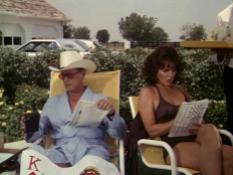









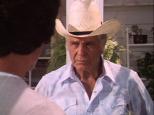














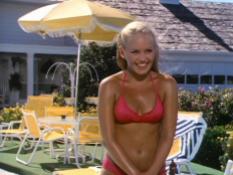









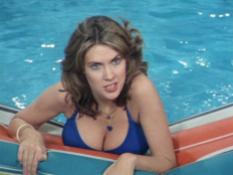

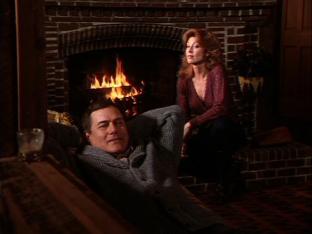








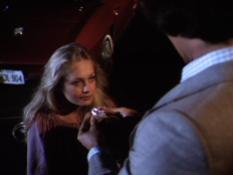

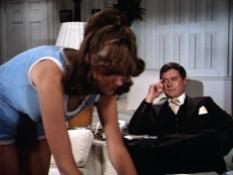







One thought on “‘Dallas’ (Season 2): A cheatin’, double-crossin’, backstabbin’ legacy begins”